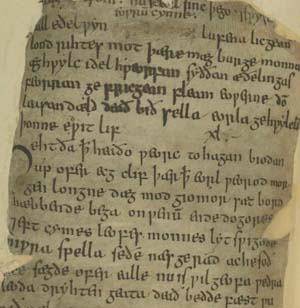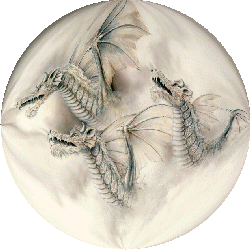

In the society in which the poem Beowulf takes place, war and kingship are normal factors in daily life. Beowulf's world is a very violent society with wars as a dominant part of daily life. Dragons and monsters are a constant threat to the Danes and the Geats. Warriors are a necessity to this war-like society. Beowulf is a hero and an example of a great warrior. He fights against monsters. In the section of the poem we are about to discuss, Beowulf is ready to fight a dragon with his thane Wiglaf. He is going to fight a dragon . Beowulf has no fear of the dragon, because he has fought many enemies that were much more ferocious. For example one of Beowulf's great battles is the fight with Grendel. No one other than Beowulf is brave enough or strong enough volunteer to fight Grendel.
We are now about to enter a new age of Beowulf's life. With all his great achievements, he finally becomes king of his homeland: Geatland. Even in his old age, his code of honor still obligates him to fight against an evil, fiery dragon. For fifty years he has governed his kingdom well. While Beowulf is governing, the dragon "...kept watch over a hoard, a steep stone-barrow" (Norton 55). Under it lays a path concealed from the sight of men. Over centuries no one had disturbed the dragons kingdom until one day when a thief broke into the treasure, laid hand on a cup fretted with gold This infuriated the dragon. "The fiery dragon had destroyed the people's stronghold, the land along the sea, the heart of the country" (Norton 57).
 Wiglaf is the only person who stays with
Beowulf to serve his lord and to fight the dragon. Everyone else becomes cowardly and runs
into the forest to hide from the dragon. It turns out that Beowulf's sword can not even
penetrate the dragon. The dragon gets the best of Beowulf, he "...seized all his neck
with his sharp fangs: he was smeared with life-blood, gore welled out in waves"
(Norton 62). Wiglaf, then, summons his wits and they killed the dragon: "The wound
which the dragon had dealt him began to burn and swell; at once he felt dire evil boil in
his breast within him"( Norton 62). Our hero is finally defeated. Even though he is
seriously injured, he still had the strength to break the fifty foot dragon in half. He
knows that his life has ended, and the all the joy of his years on earth. The days are
done, death most near. Beowulf then says, "Now I would wish to give my son my
war-clothing, if any heir after me, part of my flesh, were granted..." (62). Beowulf
is saying that if God had granted him a son that he would be the first one to receive his
armor and sword. Beowulf is then at peace.
Wiglaf is the only person who stays with
Beowulf to serve his lord and to fight the dragon. Everyone else becomes cowardly and runs
into the forest to hide from the dragon. It turns out that Beowulf's sword can not even
penetrate the dragon. The dragon gets the best of Beowulf, he "...seized all his neck
with his sharp fangs: he was smeared with life-blood, gore welled out in waves"
(Norton 62). Wiglaf, then, summons his wits and they killed the dragon: "The wound
which the dragon had dealt him began to burn and swell; at once he felt dire evil boil in
his breast within him"( Norton 62). Our hero is finally defeated. Even though he is
seriously injured, he still had the strength to break the fifty foot dragon in half. He
knows that his life has ended, and the all the joy of his years on earth. The days are
done, death most near. Beowulf then says, "Now I would wish to give my son my
war-clothing, if any heir after me, part of my flesh, were granted..." (62). Beowulf
is saying that if God had granted him a son that he would be the first one to receive his
armor and sword. Beowulf is then at peace.
Beowulf sends Wiglaf to "look at the hoard under the gray stone" (62). He tells Wiglaf to move quickly so that he may see the beautiful jewels that were kept and watched by the dragon. When Wiglaf enters the hoard, he is astonished by the beauty of the jewels. He says that there are "...many precious jewels, glittering with gold lying on the ground, wonders on the wall..."(62) There are many rusty helmets and many twisted arm-rings. There is a golden standard lighting the hoard completely. Wiglaf is eager to return and tell his lord what he has just seen. When Beowulf sees the treasure, he says: "I speak with my words thanks to the lord of All for these treasures..for what I gaze on here, that I might get such for my people for my death-day.."(Norton 63). Beowulf is saying that he will not be satisfied until all his people receive these precious treasures.
Beowulf then proceeds to take off his necklace, giving it to Wiglaf. This signifies that Beowulf's life is ending and he wants to pass on his legacy to his followers. Beowulf tells Wiglaf that he is last one left of the thanes and it is now his job to carry on the tradition: "Fate has swept away all my kinsmen, earls in their strength, to destined death. I have to go after"(Norton 63) Beowulf is saying that fate has taken the lives of all of his kinsmen and he must go as well. That is the last word spoken by Beowulf. His soul lifts from his body to "seek the doom of those fast in truth" (63). He must find new adventure destined for him.